A good working alliance—defined as the quality and strength of the relationship between coach and client—is one of the most influential factors in coaching outcomes.[1]
Several important components contribute to the working alliance within coaching (known as the “therapeutic relationship” in counseling and psychotherapy). Trust, mutual respect, and a collaborative partnership are some examples.[2]
And while there are many coaching techniques practitioners can use to foster a good working relationship during sessions with clients, it’s important to remember that the working alliance starts to develop even before that initial appointment—with coaching clients onboarding processes.
When the onboarding process is done well, it sets a positive tone for the rest of the coaching journey and fast-tracks growth and development. When not done well, poorly handled onboarding can lead to conflict and misunderstandings, delayed progress, and the client terminating sessions or simply not turning up.
Therefore, any coach who wants to succeed must develop clear and effective coaching clients onboarding processes.
In this article, we’ll break down exactly what coaching onboarding processes are, then give a thorough overview of tools and best practices you can use in your own work.
In addition, we’ll explore how digital coaching tools, like Quenza, can help streamline the beginning stages of your work with clients. These tools won’t just save you time. They’ll improve the depth and quality of your practice, benefiting both you and your clients.
Keep reading to find out more. Or if you want to get started with Quenza right away, sign up now for a free full-access 1-month trial.
The Anatomy of the Onboarding Processes
If you’re wondering, “What even is onboarding clients, anyway?” Don’t worry. You’re not alone. Depending on your background and experience, more specifically, if you haven’t certified with one of the major coaching organizations, you might have never come across the term onboarding.
Onboarding is often rolled into intake and assessment. And to be honest, some coaches and therapists don’t operate with much of an intake process at all.
However, even if your current onboarding looks just like a couple of emails or DMs before setting an appointment, you can still make some small, purposeful changes that will result in big benefits for you and your clients.
What Is Onboarding Clients?
At its core, onboarding is the crucial first step that sets the tone for the coaching relationship. It involves the systematic and purposeful process of integrating a new client into your personal coaching system.
This not only allows clients to understand your unique coaching style, tools, methodologies, and approach. It also facilitates establishing clear expectations, developing mutual respect, and building a robust relationship filled with trust.[3]
Ultimately, client onboarding serves as the bedrock on which the coaching relationship grows and evolves. And when done right, it nurtures success for both parties involved.
Onboarding Processes Explained
The onboarding process is an intricate pathway designed to facilitate the smooth transition of a client into your coaching ecosystem.
This journey typically unfolds in 2 broad stages:
- An initial consultation or discovery call to understand the potential client’s needs, challenges, and coaching goals.
The first stage is something many coaches choose to do quite informally, matching their approach to the client’s needs and preferences.
For example, if a potential client seems wary or anxious about coaching, they might not respond well to being sent a detailed questionnaire. In this case, the coach might choose a more personal method of communication to build rapport.
Alternatively, if a client seems ready to go and already has experience with coaching, a message or two might be all that’s required before moving to stage 2.
- The establishment of a formal coaching agreement, outlining roles, responsibilities, and expectations from the coaching process.
The second stage introduces the client to various coaching tools, techniques, methodologies, and resources you might use throughout the coaching journey. Here, it’s vital to ensure the client is comfortable with these tools and understands their significance.
Then, the communication cadence is set, defining how and when the client and coach will connect. For example, you might outline a schedule of in-person meetings, video calls, emails, or text messages.
Finally, a coaching contract/agreement needs to be discussed. This should entail an (ideally written) agreement on the cost of sessions and payment arrangements. Some coaches also include terms around missed/rescheduled appointments and demonstrating an ongoing commitment to the coaching process here.
Ready-Made Onboarding Resources
One of the biggest barriers to onboarding expressed by coaches is, “But I don’t have time to create a whole onboarding process!”
We get it. With everything else going on in work and life, tweaking your coaching clients onboarding process doesn’t always rise to the top of your to-do list.
Fortunately, you don’t have to go it alone.
By choosing a software partner like Quenza, you can use dozens of ready-made onboarding questionnaires and tools right away.
To give you an idea of what we’re talking about, check out these snippets from our Coaching Client Agreement.
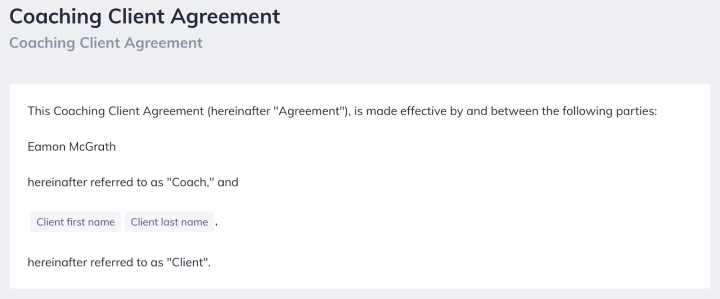
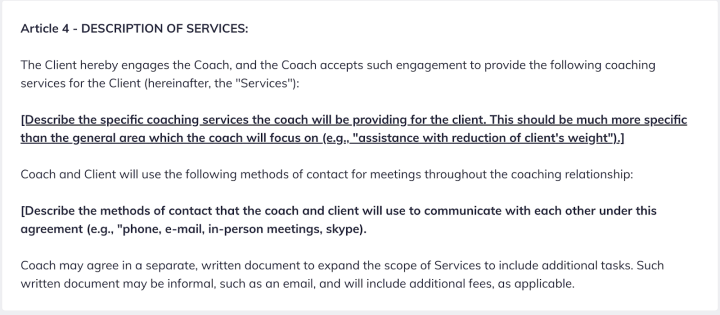
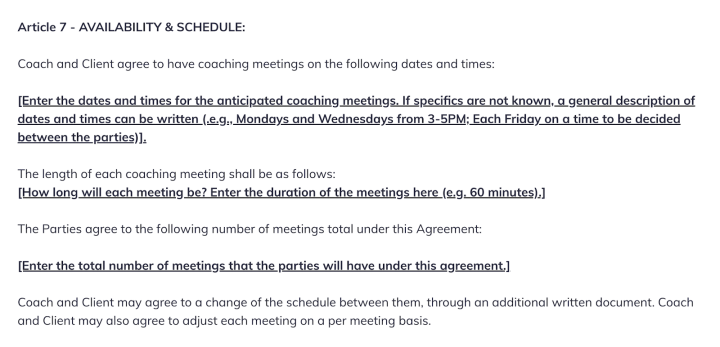
With Quenza, you can use this tool as is, or customize it to suit your exact needs.
You’ll also get access to 250+ additional worksheets, templates, tools, and resources in our huge Expansions Library.
To try it out for yourself now, sign up today for a free full-access 1-month trial.
Decoding Coaching Onboarding Questions
Coaching onboarding questions are the gateway to your clients’ minds. They are powerful probes you utilize during the onboarding process to understand your clients better and uncover their deepest needs, aspirations, challenges, fears, and potential roadblocks[4].
Effective questions may include:
- “What are your key objectives for coaching?”
- “How do you see this coaching relationship assisting you in overcoming your challenges?”
- “What challenges do you foresee in this coaching journey?”
- “How would you define success in this coaching relationship?”
These questions help the coach gain valuable insight into the client’s world. They also convey a clear message to the client: my coach is genuinely interested in my growth and committed to helping me achieve my goals.
For an example of a structured series of coaching onboarding questions, here’s a sneak peek at a few sections of the standard (but customizable) Coaching Intake Form in Quenza.
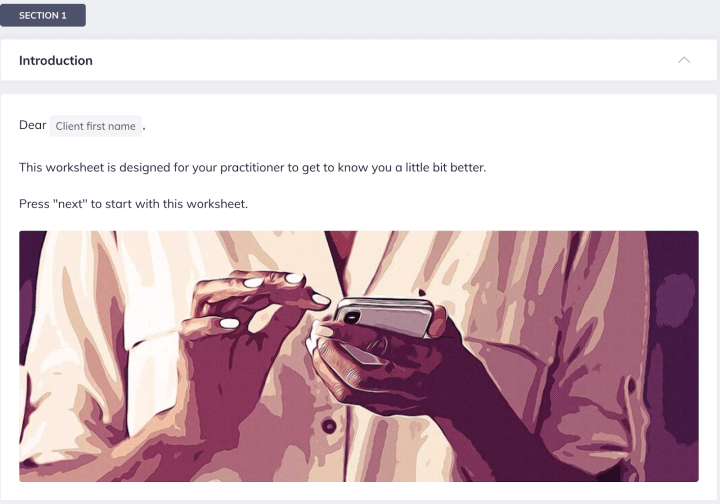
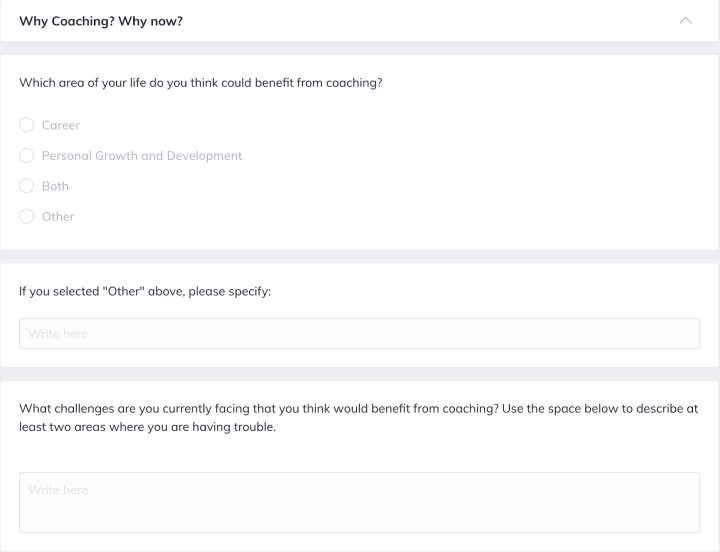
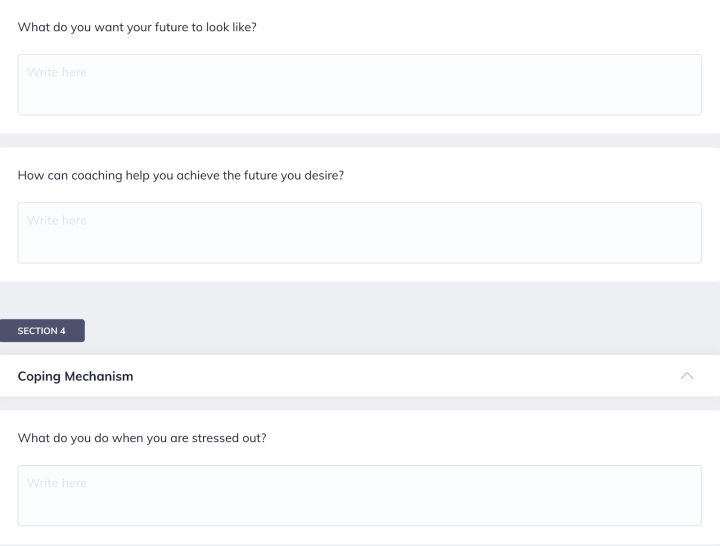
Unveiling the Best Client Onboarding Process
The best client onboarding process consists of a tailored blend of[5]:
- Efficiency
- Empathy
- Personalization
- Engagement
Let’s unpack each ingredient a little further to see how you might apply them to your practice.
Efficiency
Onboarding should begin with a warm welcome and continue with effective, focused, transparent communication about coaching expectations and methodologies.
It should not include lengthy, undirected conversations with the goal of “getting to know each other,” beyond what’s required to establish an initial rapport.
While sometimes pleasant, allowing onboarding to become overly unstructured gives the impression that neither the coach nor the client’s time is important. It also sets the tone for a more informal relationship, which can be difficult to rectify later on.
Empathy
Trust and connection are vital components of the working alliance in coaching[1]. And for both to occur, the coach must convey a level of empathy toward the client and their circumstance.
Remember, empathy and sympathy are different. Empathy involves the ability to enter another person’s life experience and frames of reference. While sympathy is expressing feelings of concern and understanding about a fellow human’s situation or history.[6]
The best way to demonstrate empathy during onboarding is to ask powerful questions to help you understand a client’s circumstances. Then, communicate back your understanding of the client’s situation.
An example of a statement demonstrating empathy would be:
- “I hear you explaining how your previous experiences of poverty have shaped some of your mindset about money.”
Personalization
Successful coaches know that each client is unique, with distinct needs, aspirations, and challenges. Therefore, they tailor their onboarding process to match the individual client’s needs, ensuring that it resonates with them and sets the right momentum for the coaching relationship.
The best way to personalize coaching clients onboarding processes is to take steps to rapidly understand the client’s personality, learning style, and preferences, then align the onboarding process accordingly.
A great way to do this is through targeted questionnaires and assessments, which can be completed before or during the initial session. One of our favorites is The Wheel of Life.
The exercise begins by asking people to rate how satisfied they are with each domain of life.

Then, clients are asked to rate each domain out of 10.
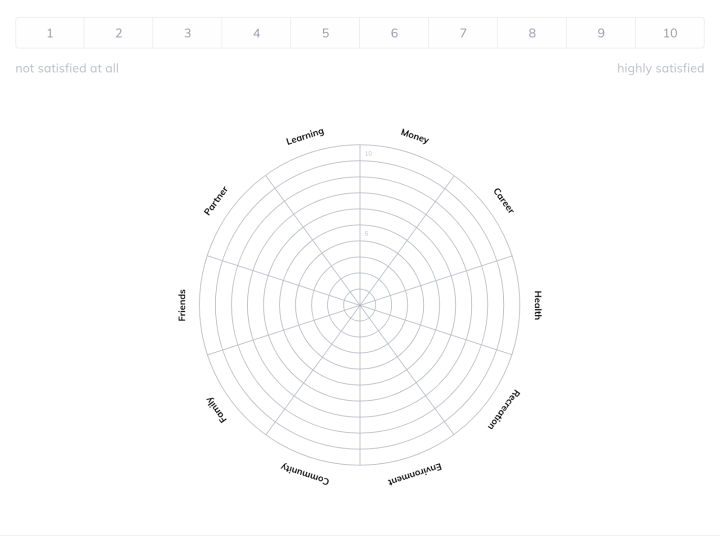
Followed by a reflective exercise on their life domains that need attention.

Once completed, the information from the Wheel of Life Exercise (which you can access by signing up for a free full-access 1-month trial) provides coaches with a wealth of information that can be used to personalize their onboarding processes for a client.
Engagement
One principle that cuts across all areas of the onboarding process is engagement.
During the beginning stages of working with a client, you are still building trust and encouraging the client to commit to the coaching process. Any disruption to engagement might result in the client choosing another coach, delaying starting coaching sessions, or losing the resolve to start coaching altogether.
Best practices for keeping clients engaged include:
- Maintaining clear and consistent communication
- Setting mutually agreeable and realistic goals early on
- Being assertive, but not pushy about booking a first session
Avoiding Information Overload
When it comes to golden rules for onboarding clients best practices, avoiding information overload is close to the top of the list.
While it’s essential to give the client an overview of the coaching process, too much information upfront can overwhelm them and create confusion. Thus, pacing the process to suit the comfort level of the client is crucial.
3 tips to avoid information overload are:
- Limit yourself to 1 or 2 standard forms and resources you give to each client.
- The rest should be tailored to their specific needs
- Don’t give the client too many options for working together.
- Avoid being too rigid with appointment times and communication methods, but not to the point that the client has to decide how to work with you. Make sure you lead the way.
- Seek feedback from the client about their onboarding experience.
- This helps you to improve the onboarding process continuously. And also makes the client feel valued and heard.
Level-Up with Client Onboarding Training
In the ever-evolving world of coaching, staying updated with the latest methodologies and techniques is crucial for success. And this holds true for client onboarding as well. Client onboarding training is a specialized skill development domain that focuses on enhancing the efficiency and effectiveness of the onboarding process.[7]
This training can equip coaches with a deep understanding of different onboarding strategies, mastery over communication, rapport-building techniques, and hands-on experience with various onboarding tools. Moreover, such training programs also provide a platform for coaches to share their experiences, learn from others, and continuously refine their onboarding process.
Professional coaching organizations, such as the International Coaching Federation, often conduct such training sessions. Participating in these can significantly enhance a coach’s onboarding capabilities, leading to improved client satisfaction and better coaching outcomes.
Harness the Power of Digital Onboarding Resources
In today’s digital age, a multitude of innovative onboarding resources are at a coach’s disposal.
These resources can significantly streamline the onboarding process and enhance its effectiveness, with some common examples being:
- Digital communication tools
- Software platforms
- Coaching books and worksheets
- Online communities
The Premier Coaching Software Solution
When it comes to software platforms to assist with the entire coaching journey (not just onboarding), Quenza is in a league of its own.
Purpose-built uniquely for coaching professionals, the comprehensive suite of features in Quenza allows you to:
- Build your own exercises with the drag-and-drop activity builder, then assign them to clients with the click of a button.
- Utilize our extensive Expansions Library, with 250+ ready-to-use customizable forms, worksheets, tools, and activities.
- Save, share, and comment on client notes.
- Run group coaching programs hosted entirely on our secure platform, with Quenza Groups.
- Send a fully automated sequence of activities to clients, called pathways.
Pathways are incredibly well-suited to admin-heavy tasks like intake, assessment, onboarding, and evaluation.
In the case of coaching clients onboarding, creating a custom process is as simple as choosing the resources to add, organizing them in a sequence, then assigning this to a client in the app.
Example Onboarding Pathway
A 5-step onboarding process for coaching with a manager or executive leader might include a pathway of ready-made resources. See the image below for an example.
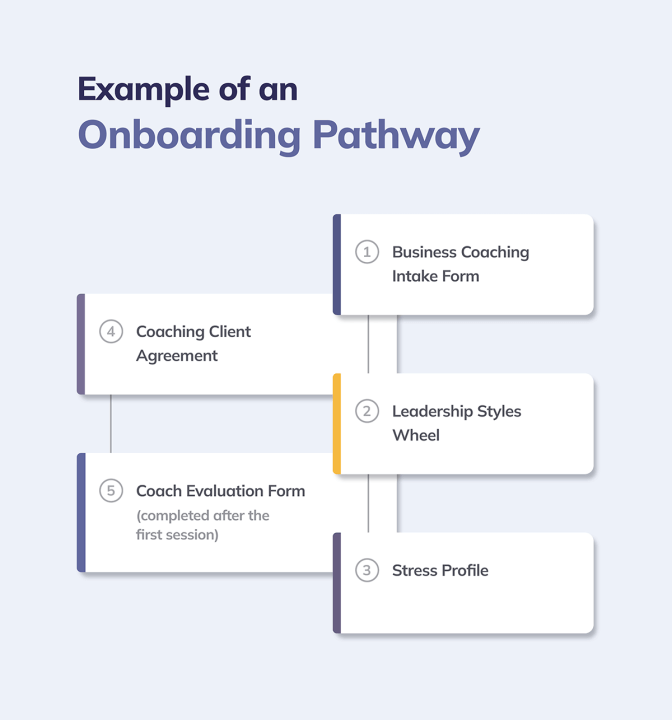
Final Thoughts
Onboarding in coaching is not just a process—it’s an experience.
An experience that can set the stage for the coaching relationship, influence the trajectory of the coaching journey, and significantly impact the overall coaching success.
As coaches, mastering the art and science of onboarding can lead to more engaged clients, better coaching outcomes, and a more rewarding coaching practice. But, like everything related to growth and change, getting coaching clients onboarding processes right involves deliberate planning, action, and evaluation.
By adhering to onboarding best practices, leveraging the right training opportunities, using effective resources, and continually refining their skills, coaches can create a memorable and impactful onboarding experience for their clients.
An experience that not only serves as a strong foundation for the coaching relationship, but also paves the way for lasting success.
To supercharge your onboarding processes (and all other aspects of your practice), why not give Quenza a try today?
Our comprehensive software solution for coaches includes everything you need to increase client engagement, scale your practice, and provide automated care.
And the best part is, you can get access to the entire Quenza platform right now, by signing up for a free full-access 1-month trial.
References
- ^ Graßmann, C., Schölmerich, F., & Schermuly, C. C. (2020). The relationship between working alliance and client outcomes in coaching: A meta-analysis. Human Relations 73(1), 35-58. https://doi.org/10.1177/0018726718819725.
- ^ Baron, L., Morin, L., & Morin, D. (2011). Executive coaching: The effect of working alliance discrepancy on the development of coachees' self‐efficacy. Journal of Management Development, 30(9), 847–864. https://doi.org/10.1108/02621711111164330
- ^ Van Niewerburgh, C. (Ed.). (2018). Coaching in education: Getting better results for students, educators, and parents. Routledge.
- ^ Grant, A. M. (2020). An integrated model of goal‐focused coaching: an evidence‐based framework for teaching and practice. Coaching Researched: A Coaching Psychology Reader, 115-139. https://doi.org/10.53841/bpsicpr.2012.7.2.146
- ^ Kimsey-House, H., Kimsey-House, K., Sandahl, P., & Whitworth, L. (2010). Co-active coaching: Changing business, transforming lives. Hachette UK.
- ^ Chan, K. (2023). Sympathy vs. empathy: What's the difference? Verywell Mind. https://www.verywellmind.com/sympathy-vs-empathy-whats-the-difference-7496474
- ^ Theeboom, T., Beersma, B., & van Vianen, A. E. M. (2013). Does coaching work? A meta-analysis on the effects of coaching on individual level outcomes in an organizational context. The Journal of Positive Psychology, 9(1), 1–18. https://doi.org/10.1080/17439760.2013.837499

